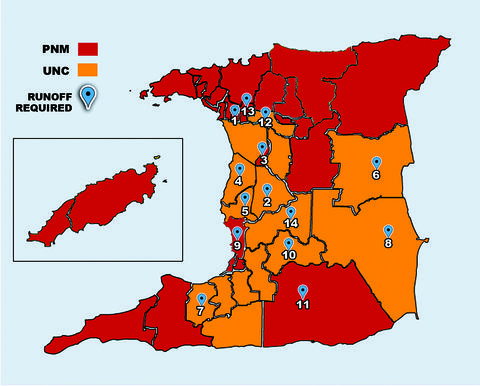How new runoff rules would have impacted 2007 polls
 If the constitutional changes being proposed by Prime Minister Kamla Persad-Bissessar were in effect during the 2007 general election, former United National Congress (UNC) political leader Basdeo Panday would have been forced to face a runoff vote for his Couva North seat. And he would have had plenty company.
On Monday, the PM proposed a series of changes to the electoral process, including term limits, the right to recall non-performing MPs and the introduction of a second ballot runoff vote system.
If the constitutional changes being proposed by Prime Minister Kamla Persad-Bissessar were in effect during the 2007 general election, former United National Congress (UNC) political leader Basdeo Panday would have been forced to face a runoff vote for his Couva North seat. And he would have had plenty company.
On Monday, the PM proposed a series of changes to the electoral process, including term limits, the right to recall non-performing MPs and the introduction of a second ballot runoff vote system.
“A runoff poll is proposed so that each member of the House of Representatives will only become such a member if he obtains more than 50 per cent of the votes cast in a constituency,” the PM said. The map (Page A1) of the 2007 general elections results highlights the potential impact of that specific proposed constitutional change. Fourteen of the 41 electoral districts—more than 33 per cent of the available seats—would have required a runoff vote.
That election was won 26-15 by the People’s National Movement and interestingly, the winner is likely to have remained the same, as the runoffs would have been required mostly in the 15 constituencies won by the UNC. Including Panday, a total of nine UNC candidates would have gone back to the polls for runoffs, in Caroni Central, Couva North, Couva South, Cumuto/Manzanilla, Fyzabad, Mayaro, Princes Town North, Tabaquite and Vasant Bharath’s St Augustine.
Bharath’s runoff would have been against his current coalition counterpart Winston Dookeran, who was then political leader of the Congress of the People (COP). The remainder of the UNC wins—Caroni East, Jack Warner’s Chaguanas West, Naparima, Roodal Moonilal’s Oropouche East, Oropouche West and the Prime Minister’s Siparia constituency—would have been won outright. The People’s National Movement (PNM) would also have been affected, although to a lesser degree.
Of their 26 seats, five would have been returned to the polls—Barataria/San Juan, Chaguanas East, Pointe-a-Pierre, Princes Town South/Tableland and St Joseph.
In this scenario, the PNM would still have won 21 seats outright—Arima, Arouca/Maloney, D’Abadie/O’Meara, Diego Martin Central, Diego Martin North/East, Diego Martin West, La Brea, La Horquetta/Talparo, Laventille East/Morvant, Laventille West, Lopinot/Bon Air West, Point Fortin, Port-of-Spain North/St Ann’s West, Port-of-Spain South, San Fernando East, St Ann’s East, Tobago East, Tobago West, Toco/Sangre Grande and Tunapuna.
In the May 24, 2010 polls, none of the winning candidates got less than 50 per cent of the votes so no runoffs would have been needed. The People’s Partnership coalition government beat the PNM 29-12 in that election.
From T&T Guardian